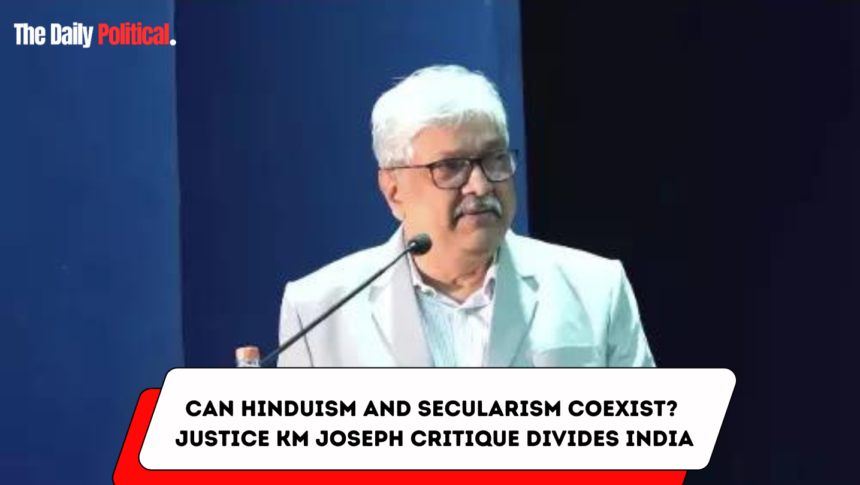New Delhi, February 23, 2024: During an insightful talk named “Secularism Under the Indian Constitution,” Justice KM Joseph, a former Judge of the Supreme Court, sparked an important discussion regarding Hinduism’s meaning, place in Indian society, and the difficulties in maintaining religious neutrality. His criticism of the 1995 “Hindutva Way of Life” ruling by the Supreme Court and the recommendations that followed raise important issues regarding secularism’s future in India, a country that is juggling its heterogeneous religious landscape. This article explores the historical and legal background, looks more closely at Justice Joseph’s main points, and considers the possible ramifications for India’s social fabric.
Hindutva: A Contentious Definition:
Justice KM Joseph’s main points of contention center on how the Supreme Court defined “Hindutva” in the 1995 ruling. In an effort to define the term, the court contended that Hinduism was more than just a religion and that it was a “way of life” that was exclusive to India. Although the goal of this interpretation was to prevent religiously discriminatory electoral practices, Justice Joseph argues that it compromises the fundamental secularism enshrined in the Indian Constitution.
Secularism and the Protection of Religious Rights:
According to Justice KM Joseph, the court is failing to defend the fundamental rights that Hinduism’s followers are entitled to under Articles 25 and 26 of the Constitution by refusing to recognize it as a religion. These articles protect the freedom of religion, which includes the freedom to follow one’s faith to the fullest and to share it with others. Hindus may lose these important rights if Hinduism is not recognized as a religion, endangering their freedom to practice their religion.
Beyond Previous Judgments: Considering Diverse Perspectives:
Justice KM Joseph goes on to criticize the court’s definition of Hinduism, citing earlier rulings as support. He contends that this strategy ignores different viewpoints, such as those put forth by well-known Hindu nationalist Vinayak Damodar Savarkar. The court runs the risk of developing a narrow definition that ignores the complexity and dynamic nature of Hinduism by excluding such a wide range of interpretations.
Neutrality Under Threat: Political Influence and Electoral Practices:
Justice KM Joseph conveys his grave concerns regarding the increasing role of religion in Indian politics, especially with regard to politicians’ use of religious discourse to influence voters. He draws attention to situations in which politicians have violated the Representation of People Act’s secularism principle by using religious sentiments to their advantage in elections. He suggests changing the Act to better address this problem and stop these kinds of discriminatory actions.
The State's Responsibility: Upholding Neutrality for All:
Justice Joseph highlights how important it is for the government to maintain religious neutrality. He contends that in order to guarantee that no religion receives special treatment or undue influence in public affairs, the state must maintain its neutrality toward all religions. He thinks that in order to create a truly inclusive and harmonious society where people of all faiths can live in harmony with one another, impartiality is crucial.
Hope for Secularism: The Resilience of Hinduism
Justice Joseph is cautiously optimistic about the future of secularism in India, despite the obstacles. His optimism stems from what he perceives to be Hinduism’s innate tolerance and open-mindedness. He contends that the great majority of Hindus embrace a wide range of religious views and that this innate pluralism provides a solid basis for a robust and dynamic secular democracy.
Conclusion of Justice KM Joseph's thought-provoking lecture :
The “Hindutva” ruling has been criticized by Justice KM Joseph, which has sparked a new discussion about Hinduism’s meaning, place in Indian society, and difficulties maintaining religious neutrality. His arguments bring up significant issues regarding the need for legal frameworks that guarantee equal protection for all religions and the proper ratio between secularism and religious freedom. Even though there are still difficulties, Justice Joseph’s optimism—which is based in Hinduism’s inherent tolerance—offers a ray of hope for a time when India’s varied religious landscape will flourish under the protection of a strong and accepting secularism.







